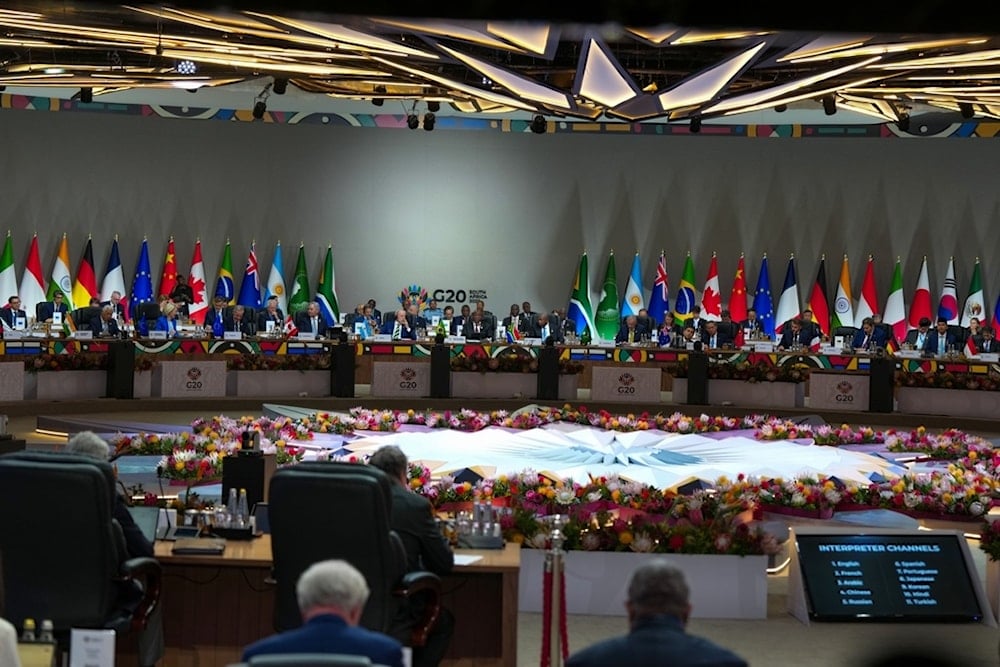G20 Summit in South Africa adopts declaration without US participation
South Africa’s G20 summit has adopted a climate-driven declaration without US input, highlighting tensions over global priorities and protocol.
-

South African President Cyril Ramaphosa addresses the opening session of the G20 leaders' summit in Johannesburg, South Africa, Saturday, November 22, 2025 (AP, Pool)
A Group of 20 leaders' summit in South Africa adopted a declaration on Saturday addressing the climate crisis and other pressing global issues, despite the absence and opposition of the United States.
The declaration was finalized without US input, prompting a White House official to label the process as "shameful". According to South African President Cyril Ramaphosa's spokesperson, the document "can't be renegotiated," signaling persistent tensions between Pretoria and the Trump administration over the summit’s outcomes.
"We had the entire year of working towards this adoption, and the past week has been quite intense," the spokesperson told reporters.
Read more: US confirms Ukraine peace plan effort, opts out of G20 discussions
G20 declaration emphasizes climate change, debt relief
The declaration, which reflects language long opposed by Washington, includes references to the urgency of addressing climate change, transitioning to renewable energy, and alleviating the heavy debt burdens faced by developing nations. Sources confirmed that the text was agreed upon by G20 envoys on Friday without US involvement.
The language marks a direct challenge to US President Donald Trump's climate stance, as he has consistently questioned the scientific consensus around global warming. US officials had previously signaled their intent to block any mention of climate change in the declaration.
"There's been overwhelming consensus and agreement that one of the other tasks we should undertake right at the beginning is to ... adopt our declaration," Ramaphosa said during the summit's opening.
"We should not allow anything to diminish the value, the stature and the impact of the first African G20 presidency," he added.
Read more: Trump snubs G20 Summit over debunked ‘white genocide’ conspiracy
Ramaphosa defends African leadership at the G20
Ramaphosa, who hosted the summit in Johannesburg, underlined the importance of unity and leadership from the Global South during this historic G20 presidency. The United States’ absence, however, was sharply criticized by South African officials.
US President Trump also rejected the summit’s central agenda, which focused on solidarity with developing countries, disaster adaptation, clean energy transitions, and lowering debt burdens.
"The multilateral platform cannot be paralysed on the basis of the absence of someone who was invited," said South African Foreign Minister Ronald Lamola.
"This G20 is not about the U.S. It's about all the 21 members of the G20. We are all equal members of the G20. What it means is that we need to take a decision. Those of us who are here have decided this is where the world must go."
EU highlights geopolitical tensions
While the G20 declaration was adopted, underlying geopolitical divides remained evident. European Commission President Ursula von der Leyen warned about the "weaponization of dependencies," referencing global tensions around trade and resources.
This remark was interpreted as a subtle critique of China’s recent restrictions on rare earth exports critical to energy, defense, and digital technologies.
Dispute over G20 handover protocol
The summit ended with a diplomatic spat over the transfer of the G20 presidency. The United States, which is due to host the summit in 2026, proposed sending its chargé d'affaires to accept the role. South Africa rejected this.
"The president will not hand over to a junior embassy official the presidency of the G20. It's a breach of protocol that is not going to be accommodated," said presidency spokesperson Vincent Magwenya.
"America chose to boycott the summit. That's their choice, and that's their prerogative to do so."
Read more: Trump declares ‘Victory’ on climate change after Bill Gates’ remarks

 4 Min Read
4 Min Read








